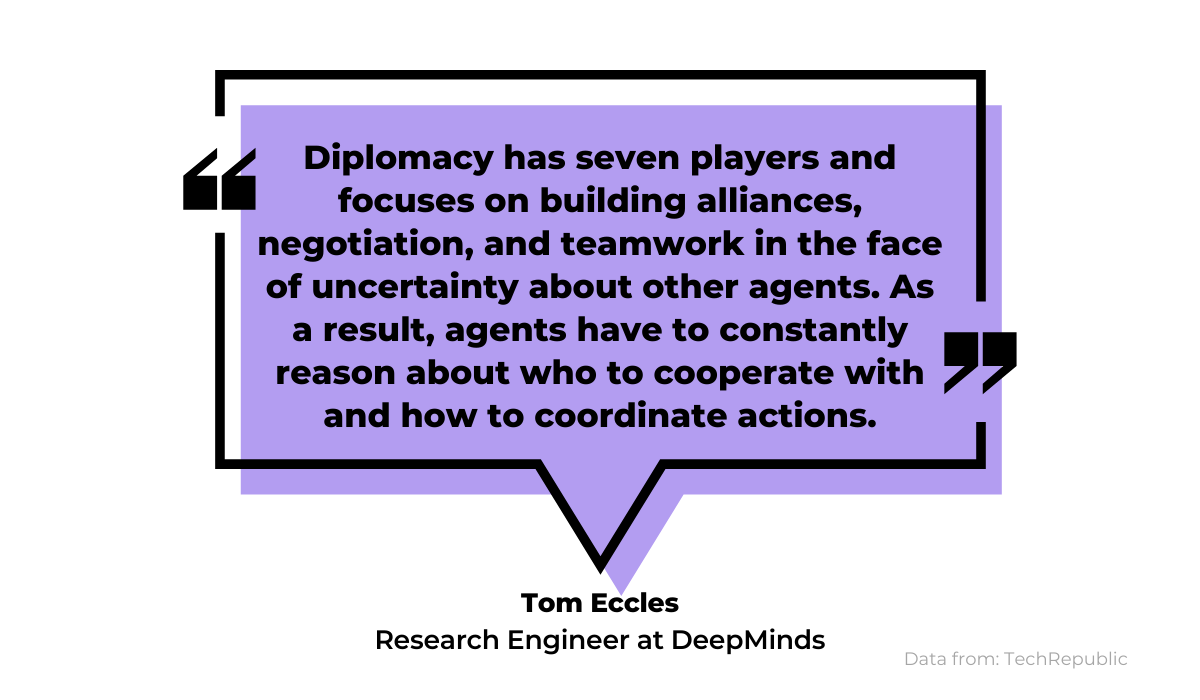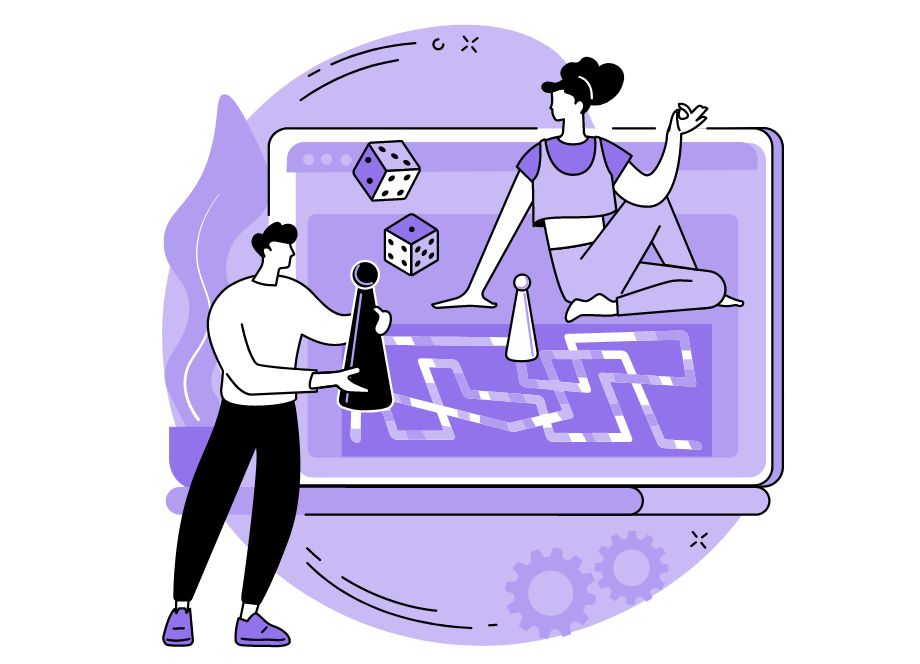
Your developers can’t spend all 8 hours of the working day in front of a screen, especially not highly focused, so your office environment shouldn’t force constant work.
Taking breaks and giving your employees a chance to breathe is important. Otherwise, they will burn out.
Team building activities are a great way to help your developers get their minds off the code while also improving their performance in a variety of ways—and board games are among the cheapest and easiest to organize.
A board game is a fantastic way to ensure your developers get the rest they need. It also has the added benefit of boosting teamwork and collaboration between team members.
This article will give you all the board game ideas you need when organizing your next team building.
Table of Contents
1. Dungeons and Dragons
You’d have difficulty finding a developer who hasn’t played Dungeons and Dragons. The best-selling role-playing game has been around for 45 years, and its popularity hasn’t waned.
It’s easy to see why the game is popular, as it’s driven by imagination and problem-solving.

Get unreal data to fix real issues in your app & web.
The game is led by a Dungeon Master—the player who creates the world, designs the storyline and explains to the other players where they are and what their objective is.
The other players take on the role of different fantastical characters, ranging from barbarian to wizard and more.
The photo below displays the standard set-up, including a map, dice, character sheets, and an adventure book:

With these resources, the Dungeon Master will devise a story the characters must navigate through, including combat situations and puzzles.
The game is an excellent method of honing problem-solving skills and improving collaboration, as players will have to work together to achieve their goals.
Timm Woods, professional Dungeon Master, also makes this point:

A tech workplace can sometimes be alienating, but a game of Dungeons and Dragons is a surefire way to foster connection between your employees and improve teamwork.
2. Diplomacy
Diplomacy is a classic board game based solely on negotiation and smarts. Released in 1959, it’s a precursor of many modern strategy games, including the Game of Thrones board game.
The gameplay is set at the beginning of the 20th century, in the years leading up to World War I.
Players become one of the seven “Great Powers of Europe”—Russia, France, Great Britain, Germany, Italy, Turkey, or Austria-Hungary—and then try to grow their empire via alliances, negotiations, and sometimes betrayal.
Players direct their military units by writing orders, such as moving into territories, supporting an ally, etc. Each turn unfolds based on these orders coupled with the game’s rules.
There are no dice or other arbitrary elements, so the game’s outcome boils down to pure negotiation.
The game’s set-up is shown in the photo below:

The complex level of political scheming demands high collaboration, which makes it an excellent vehicle for improving teamwork.
Tom Eccles, a research engineer at DeepMind, also commented on this:

The game is a superb team-building exercise, as developers must work together to ultimately reach their goal of winning the game.
3. Burke’s Gambit
Burke’s Gambit is a hidden role/social deduction game.
It consists of two groups of players: one that wants to save the Earth from an astronaut infected with a parasite and another aiming to weaponize the parasite.
The catch is—no one knows who the infected astronaut is. Furthermore, no positive players know who’s on their team, as everyone pretends they want to defend the Earth.
However, the villains do know who’s on their team. They all work together to gang up on the heroes.
Ultimately, the game’s focus is on persuasion. The good guys must convince the others that they’ve found the infected astronaut and are working in the Earth’s best interest.
Meanwhile, the bad guys have to lie, convincing others they’re doing the same.
The game’s layout is shown below, complete with character cards and dice:

The game is an excellent resource for developers dealing with non-technical employees.
In such situations, developers must lay out arguments clearly and convincingly—and this game can teach them how to do so.
The post below proves the game’s popularity among software engineers:

The premise was intriguing enough to interest this developer, as they ordered it for their workspace.
4. RoboRally
RoboRally is, as the name suggests, a racing game. Players must guide their robot unit through a factory and try to arrive at several checkpoints before the other robots do.
However, there’s a catch—moves must be decided five turns in advance. Players will have to strategically map out their movements without knowing what the future map will look like.
The game becomes difficult because although the players decide their moves five turns earlier, each player still performs moves one by one.
As a result, there’s a high chance a robot will be blocked by another, be bumped into several spaces, and so on.
Additionally, there are several obstacles on the board that also impede the robots’ path.
One reviewer linked the game to coding, as players must plan their moves before playing:

To win the game, extensive planning and forethought are required—just like in coding. This makes the game relatable and accessible to most developers.
The board is displayed below, clearly showing the checkpoints and the outline of the maze:

The conveyor belt shown above is also a potential obstacle—these pesky contraptions can transport robots to an entirely new location.
5. Lovelace & Babbage
The names Lovelace & Babbage should ring a bell for most software developers, even if they never play board games.
Ada Lovelace is commonly credited with writing the first computer algorithm, whereas Charles Babbage designed some of the earliest computing machines (although he never saw them built).
In this game, players try to program the first-ever computer.
The game rewards those with mathematical proficiency, as progress is made by solving equations.
Players begin on a starting two-digit number and then upgrade to a different number, using mathematical operations—for example, add/subtract by 10, reset the number to 55, and the like.
As gameplay continues, more complicated operations become available. Round numbers are eliminated, and instructions such as add 33 appear.
Players gain more points if they utilize these more demanding operations instead of the more straightforward round-number operations.
You can see these various operations in the image below:

As you can see, mathematical skills are essential for completing the game.
In addition to the mathematical aspect, a Game Boy Geek review also praised the game for its similarity to coding:

Developers are sure to appreciate the game, primarily because of the focus on computer engineering and the similarities to proper coding.
6. Quirky Circuits
Similar to RoboRally, Quirky Circuits is also focused on robots. However, this game is cooperative.
Players direct commands to their robots to move them around a room and complete a task together.
Commands are given via instruction cards, and there are four robots in total.
Each unit has unique functions and default moves, so the cards sometimes include different instructions depending on the robot used.
The game’s set-up—board, cards, and tokens—are displayed below:

What makes the game truly challenging, however, is that players cannot communicate their commands.
The instruction cards are placed face-down until the movement is executed, so players can only guess what moves the others will make.
In other words, deductive reasoning is needed to win the game. Players must anticipate what other players will do, and if something goes wrong, discuss how to fix it afterward.
In this regard, the process is similar to debugging—players must cooperate to solve problems.
The game was even called the king of programming games by this Reddit user:

Both the subject matter (robots) and problem-solving processes (reminiscent of debugging) are sure to appeal to developers.
7. Dominion
If you have any developers who are fans of Magic: The Gathering, try introducing them to Dominion —they’re sure to love it.
Dominion is a deck-building game where each player begins the game with an identical, small deck. Then, as the game progresses, players buy cards to slowly build their deck.
You can see some of these cards in the picture below:

The most basic turn in the game consists of one buy and one play, although players will want to extend their turn as much as possible.
To achieve this, some cards allow additional playing and buying, and then players can advance much farther during their turn and gather more points.
The player with the most points at the end of the game wins.
This aspect is reminiscent of a key skill developers often use—chaining. With chaining, data is sent to one method, and that method’s results are then transferred into another method.
Here’s a chaining example in Ruby:

Although this is code, the same principle applies as in Dominion—chaining cards result in more functions, and each card enables playing another card.
8. Tzolk’in: The Mayan Calendar
In Tzolk’in, players take control of Mayan tribes, positioning their figurines on giant, connected gears.
These gears rotate during gameplay, taking figures to different map locations. You can view the gears below:

Each gear has a figurine placement space, which is also attached to a resource spot. As players move figurines, they collect resources with each new spot.
However, when placing a figurine, players must set them down on the least valuable resource spot.

Very handy for handling user feedback. CTOs, devs, testers – rejoice.
In other words, if previous players visited that gear, you’re in luck—they’ve gathered the less valuable resources. Then, you can place your figurine on the more valuable fields.
Players can also pick up figurines. This triggers specific actions depending on their position. The same principle applies as with resources: later actions pay off more.
In other words, time management is vital. This Reddit user even likened the gameplay to DevOps:

Feedback loops and continuous learning are core DevOps principles, and both concepts can also be seen in Tzolk’in.
The former deals with relationships between entities where changes influence each entity. This can be seen in the gears.
The latter has to do with constantly adapting gameplay based on current circumstances.
9. Pixoid
If you want to give your developers a mental break, Pixoid is one of the simpler programming board games. The game’s premise is straightforward—Bugs are trying to capture a Pixoid.
Players alternate between playing the Pixoid outrunning the Bugs and the Bugs chasing after the Pixoid.
All players choose their moves in secret, so no one knows what the other player will do next.
Not even the Bugs can communicate with one another to strategize a capture plan, and the Pixoid always moves first.
A minimum of three players is necessary to play the game, as there must be at least two players trying to catch the Pixoid. Four players are the maximum so as not to overwhelm the sole target.
The game’s board is depicted in the visual below:

The game might remind you of Pac-Man, the concept is similar.
Keith Law, a writer at Ars Technica, described the game as one of the most uncomplicated yet enjoyable programming games. In his words, the gameplay emphasizes the following feature:

Although the gameplay isn’t complicated, it relies on concepts similar to programming and is sure to delight your developers.
10. Fields of Arle
If your development team is small, Fields of Arle is ideal. Designed for two players only, it focuses on two farmers aiming to expand their estate.
The game’s board is divided into two sections: a Summer and a Winter season. You can see this below:

The challenge is that the majority of actions on one side of the board demand resources from the other side.
This makes planning difficult, as the worker figurines always bounce between the two fields.
As a result, this game’s primary focus is on decision-making.
There are multiple strategies and moves to choose from, all possible pathways to complete some of the game’s objectives.
The plethora of actions impedes intelligent decision-making, as the players’ brains are bombarded with options.
This is called an overloaded cognitive load—when your brain cannot reason well due to too much information. Cognitive load is defined as follows:

When the cognitive load becomes too excessive, developers lose the ability to make rational decisions.
This often happens during coding, with its infinite branching logics, and especially during debugging.
Fields of Arle is excellent for developers—it helps them learn to manage their cognitive load.
Conclusion
If you’re ever in doubt about how to organize your next team building, give these board games a try.
From the long-winded Dungeons and Dragons to the simplistic Pixoid, there’s a game for every software developer. It’s just a matter of selecting the best one for your team.
With some games, cooperation between your team members is sure to increase, as they work together to win the game.
With others, they’ll develop other essential workplace skills, such as decision-making and time management.
Whatever game you choose, however, one thing is certain—your developers will definitely enjoy themselves.




